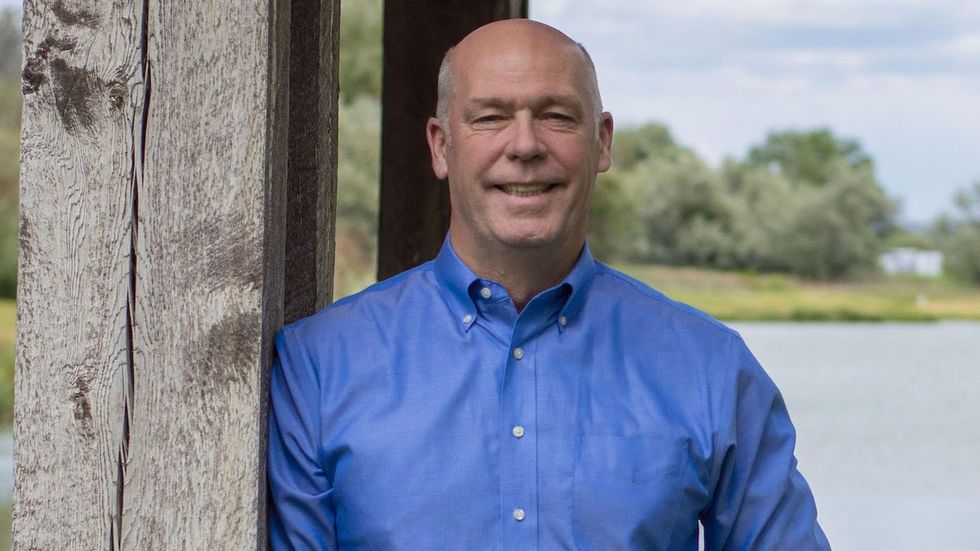Montana Gov. Greg Gianforte has signed into law a bill banning gender-affirming care for transgender minors.
Gianforte, a Republican, signed the legislation Friday, and it is scheduled to take effect October 1, the Montana Free Pressreports. He supported the measure over objections from his gay nonbinary son, David Gianforte.
The Human Rights Campaign termed the measure “draconian” and said it was made worse than its original version because of amendments requested by the Republican governor. Senate Bill 99 “is a wide-ranging bill that would make it effectively impossible for health care practitioners to provide age-appropriate, best practice, gender affirming care to transgender youth,” says an HRC press release. “It would also forbid state employees who work with minors from ‘promoting’ treatment for gender dysphoria, chilling the ability of educators, public health workers, child care workers, and employees of state medical facilities to be able to do their job. Recipients of Montana Medicaid and the CHIP program will not be able to receive coverage for gender-affirming care.”
Health care professionals who violate the law could see their licenses suspended for up to a year. SB 99 further allows them to be sued for up to 25 years after performing a banned procedure, and these procedures could not be covered by malpractice insurance. Banned treatments for people under 18 include puberty blockers, hormones, and surgeries if done for the purpose of gender transition; they’re allowed for young people who have a disorder of sexual development. Genital surgeries are almost never performed on minors.
The ban on the promotion of treatment applies to social transition as well as medical. Officials with the Movement Advancement Project said it’s the first legislation they know of that restricts social transition.
The legislative process for SB 99 was particularly contentious. Democratic Rep. Zooey Zephyr, one of the first trans lawmakers in Montana, told her colleagues they’d have “blood on your hands” if they approved the bill. Republicans, who hold a majority in the legislature, then barred Zephyr from speaking on the House floor for the rest of this year’s session. Some citizens who came to the capitol to demonstrate their support for her were arrested.
LGBTQ+ activists and allies expressed hope Friday that the law would be blocked by court action. Akilah Deernose, a staff attorney with the American Civil Liberties Union of Montana, responded to the bill’s signing by saying “See you in court,” the Free Press reports.
“My bottom line to families is that this care remains legal,” Kathryn Lowe, a Bozeman pediatrician and member of the Montana Chapter of the American Academy of Pediatrics, told the publication. “To all the families who are panicking, who are moving, who are listing their houses to sell … we have great hope that [SB 99] will never take effect.”
Zephyr added, “These bills are as cruel as they are unconstitutional. And I have no doubt that they will go down in court. But at this moment we have to care for our communities given that the government has failed to do so.”
“Governor Gianforte is an extremist, and the last thing he cares about is the well-being of transgender kids,” said a statement from Cathryn Oakley, HRC’s state legislative director and senior counsel. “The care he and the legislature have forbidden today is age-appropriate, best practice care supported by the entire American medical establishment — care that helps children grow into their full potential. This bill prevents certain kids from getting potentially life-saving health care simply because those kids are transgender — and that’s discrimination. Montana families deserve so much better.”
This week Gianforte also signed House Bill 361, which states that it is not discrimination to refer to a student by their “legal name” or the sex they were assigned at birth — that is, to deadname or misgender them. A bill is still pending that would define sex according to a person’s reproductive capability, as is one restricting drag performances.
Other states that have outlawed most or all gender-affirming care for trans minors through legislation are Alabama, Arizona, Arkansas, Georgia, Idaho, Indiana, Iowa, Kentucky, Mississippi, North Dakota, South Dakota, Tennessee, Utah, and West Virginia. Florida has put a ban in place through its medical boards and is considering a bill for an even stricter measure. Missouri's attorney general has put out severe restrictions on this care, but they are now temporarily blocked by court action, as are the Alabama and Arkansas bans. Bans are pending in several other states.


















































































Here's our dream all-queer cast for 'The White Lotus' season 4